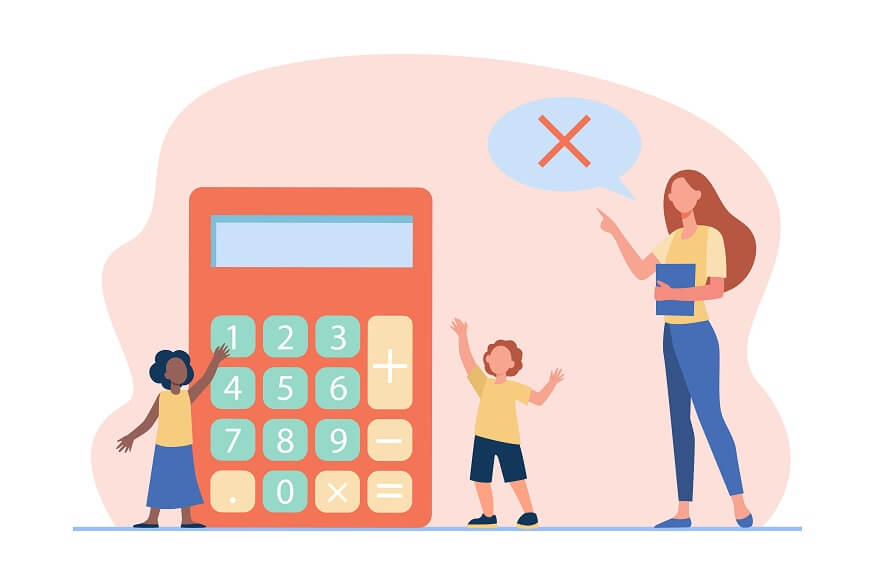Dyscalculia is a learning disorder characterised by trouble with mathematics.People with dyscalculia frequently have trouble adding up or solving other mathematical issues because they have trouble understanding basic arithmetic ideas.
The goal of this blog is to help readers gain a better knowledge of dyscalculia in kids by examining its causes, signs, and potential remedies.
Also Read: What Is Learning Disability? 8 Career Options for Students with Learning Disabilities
Dyscalculia Meaning
Dyscalculia, colloquially known as ‘number dyslexia’, is a specific learning difficulty that affects a child’s ability to understand, learn, and perform mathematical tasks. Despite its prevalence, dyscalculia is often misunderstood or overlooked, which can result in a child struggling unnecessarily. This condition has more to do with the brain’s capacity to process numbers than it does with a person’s general intelligence or ability.
It’s also worth mentioning that dyscalculia is different from general maths anxiety. While a child with maths anxiety may feel stressed about maths because they worry about getting answers wrong, a child with dyscalculia faces a fundamental challenge in understanding and working with numbers and mathematical concepts.
Also Read: What is Kinesthetic Learning? Meaning, Style, Examples, Activities
Dyscalculia Symptoms
Symptoms of dyscalculia can vary among individuals and can manifest in different ways based on the person’s age. The symptoms of dyscalculia can vary greatly from child to child, and they often change as the child ages. However, here are some common signs that a child might have dyscalculia:
Difficulty Understanding and Using Numbers: Children with dyscalculia may struggle to comprehend and manipulate numbers. They might have trouble recognising number symbols or fail to understand what these symbols represent.
Challenges with Calculation: Performing simple arithmetic tasks can be a struggle. Children may not understand mathematical symbols such as plus, minus, multiplication, or division, making it hard for them to complete even basic sums.
Problems with Time: Grasping the concept of time and accurately judging the passage of time can be a challenge. Sequencing events or following a schedule can also be problematic.
Spatial Orientation Issues: Dyscalculia can often co-occur with difficulties in understanding spatial relationships or directions.
Trouble with Everyday Tasks: Simple everyday tasks involving numbers can be hard, such as telling the time, handling money, or following a recipe.
Also Read: What is teenage stress? Causes, symptoms and stress management for teens
Dyscalculia Causes
The specific learning problem known as dyscalculia has an impact on a person’s capacity to comprehend and use numbers and mathematical concepts.
Even though the precise origins of dyscalculia are not fully understood, researchers believe that a combination of genetic, neurological, and environmental factors may be involved.
Here are some potential causes:
Genetic Factors: There is evidence to suggest that dyscalculia may have a genetic component. It tends to run in families, and individuals with a family history of learning disabilities are at a higher risk of developing dyscalculia.
Brain Differences: Brain imaging studies have shown that individuals with dyscalculia may have differences in brain structure and function, particularly in areas related to numerical processing and mathematical reasoning.
Neurological Factors: Dyscalculia is thought to be associated with difficulties in processing and manipulating numerical information. According to some experts, issues with the parietal lobe, a part of the brain involved in mathematical reasoning, may be the cause of these challenges.
Working Memory Deficits: Working memory refers to the ability to hold and manipulate information temporarily in the mind. Working memory issues may be present in people with dyscalculia, which may impair their capacity for computation and conceptual retention in mathematics.
Environmental Factors: Adverse early experiences or a lack of exposure to early maths concepts may also contribute to the development of dyscalculia. For instance, children who do not receive sufficient opportunities to learn and practise basic number skills may struggle with more complex mathematical concepts later on.
It’s important to note that dyscalculia is not caused by low intelligence or lack of effort. It is a specific learning disability, and individuals with dyscalculia often have normal or above-average intelligence in other areas.
Also Read: Developing Fine Motor Skills through Fun Activities for Kindergarteners
Dyscalculia Diagnosis and Treatment
A thorough evaluation is required to diagnose dyscalculia, and this evaluation is normally carried out by an educational psychologist or a specialist instructor.
An evaluation of the child’s verbal, cognitive, and mathematical prowess should be part of the process. If a child’s mathematical ability is significantly below what would be expected given their age and overall intelligence, a diagnosis of dyscalculia may be made.
While there’s no specific ‘cure’ for dyscalculia, there are several approaches that can help manage the condition and improve a child’s number skills:
Educational Intervention: One-on-one tuition or small group sessions focusing on maths can be beneficial. Instruction typically breaks down mathematical concepts into smaller, more manageable steps. Instruction often involves breaking down mathematical concepts into smaller, manageable steps. Educational therapists can use visual aids or manipulatives to help individuals better understand mathematical concepts.
Accommodations: Schools can offer various accommodations, such as allowing extra time on tests, permitting the use of a calculator, or providing written instructions for maths homework.
Psychotherapy: Therapy can help children deal with feelings of frustration, anxiety, or low self-esteem often associated with learning disorders like dyscalculia.
Training for Parents and Teachers: In order to employ specific tactics to enhance the learning of the child, parents and teachers must have a thorough understanding of dyscalculia.
Although dyscalculia is a lifelong illness, children with it can achieve in maths and other areas of life with early identification, the right intervention, and continued support.
It’s crucial to get expert assistance if you think your child could have dyscalculia so they can get an accurate diagnosis and create a tailored support plan for them.
Remember, every child has unique strengths and weaknesses – dyscalculia is just one aspect of a child’s overall learning profile.
Remember, if you or a loved one are experiencing symptoms of dyscalculia, it’s crucial to reach out to a professional who can provide a proper diagnosis and suggest a personalised treatment plan.
Also Read: What are the factors that affect a child’s height
The information provided on this website is not a substitute for professional medical advice. EuroSchool encourages you to consult with a qualified healthcare professional for any health concerns you may have. The information on this website is not intended to diagnose, treat, cure, or prevent any disease.
EuroSchool is committed to providing a holistic education to all children, regardless of their abilities. They believe that all children can learn and grow, and they strive to create an inclusive environment where all learners feel welcome and supported.









